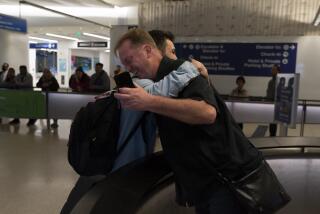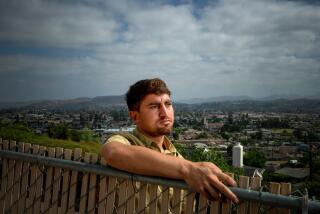INS Judge Frees Iraqi Dissident Held for 4 Years
- Share via
Calling charges of espionage “ill-founded,” an immigration judge on Friday freed an Iraqi dissident who had been jailed for nearly four years based on secret government evidence suggesting that he was a spy for a Middle East country.
Dr. Ali Yasin Mohammed Karim, 39, walked out of the U.S. Immigration and Naturalization Detention Center in San Pedro shortly after 3 p.m. accompanied by his brother and his attorneys.
For the record:
12:00 a.m. Aug. 20, 2000 For the Record
Los Angeles Times Sunday August 20, 2000 Valley Edition Metro Part B Page 3 Zones Desk 1 inches; 31 words Type of Material: Correction
A Saturday headline [in the Valley and Ventura editions] about the release of an Iraqi dissident from a U.S. Immigration and Naturalization Center misstated the location of the facility. The center is located in San Pedro.
“I was kept for four years by the INS for things I never heard about,” Karim said as he proceeded from the federal compound on Terminal Island. “I am innocent, but I have paid a high price.”
Karim was part of a group of six dissidents evacuated from Iraq by the United States in March 1997 only to be jailed by the INS and threatened with deportation back to their homeland. The case against them was based on classified evidence kept secret from defense attorneys during immigration hearings in 1997 and 1998.
Their plight attracted national attention when former CIA Director R. James Woolsey, now a Washington lawyer, joined Karim’s defense team and led the effort to declassify the government’s evidence.
After the information was released, five of the Iraqis accepted a government offer to remain in Nebraska until they could relocate to another democratic country.
Karim, however, decided to fight the charges and pressed his claim for political asylum. He was retried in April by U.S. Immigration Judge D.D. Sitgraves, who originally concluded that Karim was a threat to national security.
In reversing her earlier decision, Sitgraves said that Karim “has sufficiently demonstrated that the government’s claims were ill-founded and has rebutted the presumption that he constitutes a risk to the security of the United States.”
Sitgraves concluded in her 123-page opinion that the screening process used by the FBI to determine if Karim was a potential security threat was insufficient and conducted by agents who had limited knowledge of Iraq and its people.
Political asylum in the United States should be granted, she ruled, because the doctor has established a well-founded fear that he would be persecuted if sent back to Iraq. She issued the same ruling for his mentally ill brother Mohammed.
Overall, Sitgraves concluded that the low standard used to prove security risks, combined with the initial veil of secrecy, kept significant issues and facts hidden from Karim’s attorneys until the evidence was declassified.
“He was a victim of the use of secret evidence by the government,” said Niels W. Frenzen, an attorney with Public Counsel in Los Angeles, which represented the doctor. “These were freedom fighters. They risked their lives. They risked the lives of their families. Then they were betrayed by the U.S. government.”
Karim, who plans to stay in the United States, is a former member of the Iraqi National Congress, a large political and military organization that fought against dictator Saddam Hussein. His responsibilities included providing medical treatment to the top echelon of the Iraqi opposition movement.
The doctor has been in federal custody since he was evacuated by the U.S. government from northern Iraq in late 1996. While he sat in jail, Karim’s wife filed for divorce and he has been separated from his two sons.
INS officials in Los Angeles could not be reached Friday; they had declined to comment on the case while it was pending. Government attorneys have 30 days to appeal Sitgraves’ decision.
Attorneys for the INS have contended that there is a reasonable belief Karim is a danger to national security. They have argued that one of the doctor’s cousins is a suspected Iranian intelligence agent, the doctor’s travel patterns were suspicious, and he might have misled federal agents about how his brother Mohammed made it into the United States.
Defense lawyers say the declassified material amounted to little more than rumor.
They said the espionage allegations were largely based on uncorroborated reports culled by FBI agents from Iraqi refugees, who were interviewed in Guam by the FBI after being evacuated from Iraq.
That information shows, for example, that one FBI agent thought Karim might be a spy for Iran, while another agent thought he was a mole for Iraq; the two countries are enemies.
In addition, the summary states that Karim’s cousin, Aras, is suspected of being an Iranian intelligence agent, but it offers no specifics.
Evidence presented during the retrial suggested that the government may have attached nefarious motives to innocent activity. Testimony showed that the allegedly suspicious travel patterns included trips Karim took to Syria and Iran either as a child or to escape military attacks by Hussein.
Witnesses further indicated that Karim has never changed his name, and the Iranian contacts with the Iraqi National Congress were open and tolerated by the United States government.
A former CIA section chief stationed in northern Iraq in the mid-1990s also testified that he never received any information linking the doctor to foreign intelligence.
Karim’s attorneys have shown that many of the doctor’s relatives have been allowed to stay in the United States despite the government’s concerns about the doctor.
More to Read
Sign up for Essential California
The most important California stories and recommendations in your inbox every morning.
You may occasionally receive promotional content from the Los Angeles Times.











